January 29, 2017
by Carole Zangari -
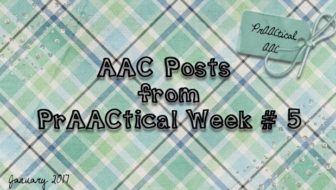
Can it really be the last week of January?! It was a great month for AAC learning, checking in with on-going projects, and planning for new ones. I’m looking forward to conversations with AAC stakeholders from around the world this Wednesday on Twitter, as I host the #ATchat (Feb 1, 8:00 pm ET). If you are new to Twitter or Twitter Chats or just don’t ‘get’ how it can support professional growth, you can learn more about that here. Even if you are an infrequent Twitter user, or if you are more of a lurker than a participant, we welcome you to join us. In the meantime, here are some of last week’s posts that you may have missed. Monday: AAC Mythology v2.0: A Few Misconceptions About AAC Intervention Wednesday: Video of the Week: Embedding AAC Throughout the Day Thursday: Reducing Prompt Dependence in AAC Learners: 5 Things to Try While you’re thinking about... [Read More...]
Filed under: Featured Posts
Tagged With: summary post, twitter
January 26, 2017
by Carole Zangari -
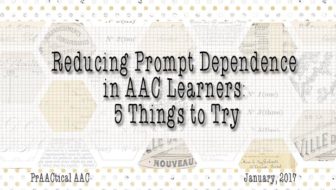
“He knows what to do. He just doesn’t do it.” “He’s prompt-dependent. How can I get him to use AAC on his own?” “I love his strong-willed nature, but it works against him sometimes. He doesn’t initiate.” If any of these remarks sound familiar, it may be time to think about alternative approaches to build independent communication. Here are a few things to try with AAC users who’ve learned to wait for support before communicating. Exaggerate the pause time: Many of our AAC learners need at least 5 seconds of pause time after a communication opportunity presents itself. This helps them process the experience, organize their thoughts, decide on a response, and then begin to execute that response. Sometimes, though, we work with people who’ve learned that if they just wait, the communication partner will start to help (whether or not they need it). We can sometimes nudge the learner... [Read More...]
Filed under: Featured Posts, PrAACtical Thinking
Tagged With: implementation ideas, prompting, the fives
January 23, 2017
by Carole Zangari -
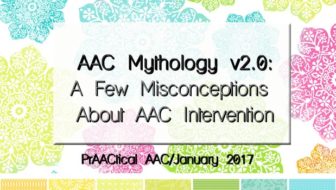
The good news is this: A growing number of people with complex communication needs are getting access to AAC. Educators whose students had AAC only at circle and snack time are now using it more consistently with their students throughout the day and teaching lessons specifically designed to build skills with AAC systems. SLPs who had eschewed AAC or who had focused their AAC efforts on choicemaking, requesting, and labeling are now embracing their role as language specialists and teaching a fuller array of semantic, morphological, and syntactic skills to AAC learners. AT specialists who had been doling out the same few SGDs and AAC apps are now digging deeper and using established practices for AT selection in supporting minimally verbal and nonverbal students. Behaviorists who had previously focused primarily on receptive identification and verbal imitation are supporting the expressive needs of their clients in new ways. Families who had little... [Read More...]
Filed under: Featured Posts, PrAACtical Thinking
Tagged With: intervention, language development, myth
January 22, 2017
by Carole Zangari -
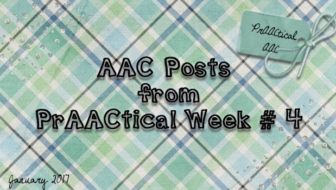
It was an action-packed week at the ATIA Conference, filled with AAC learning, new products, and connecting with colleagues. Here are a handful of posts that you may have missed in your busy week. Monday: Core Values: Suggestions for Language Building with AAC Learners Wednesday: Video of the Week: Supporting Preschoolers with AAC Needs-A Case Study Thursday: PrAACtical Resources: Developing Touchscreen, Switch and Eye Gaze Skills
Filed under: Featured Posts
Tagged With: summary post
January 19, 2017
by Carole Zangari -
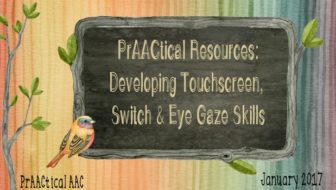
As a speech-language pathologist, most of my attention goes to strategies for building language and communication, but there is, of course, much more to AAC. The Independent Living Centre Western Australia (ILC) has a wonderful set of resources that focus on the operational aspects of AAC, a critical area for many individuals with complex communication needs. This is a great site to check out for ‘how-to’ information on how to help AAC users develop skills with direct selection (eye gaze, touch screen) and scanning. Many thanks to ILC and the Unlocking Abilities Project for making these available.
Filed under: Featured Posts, PrAACtical Thinking
Tagged With: access, direct selection, eye gaze, Scanning, switch
January 16, 2017
by Carole Zangari -
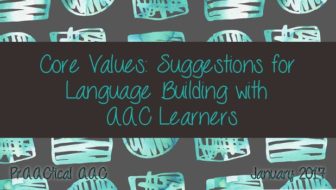
Here in the US, we celebrate the life of Dr. Martin Luther King Jr on the third Monday of January. It presents, among other things, a wonderful opportunity to talk and teach about concepts like tolerance, fairness, dignity, respect, and peaceful protest. Many of our AAC learners have a deeper understanding of these concepts than we will ever realize but they lack the language skills to discuss them in the same ways as their speaking peers do. Today, we share some ideas for continuing the conversation about these issues to help our AAC learners continue to develop their language skills. You may already have books, videos, and other resources that are useful in teaching about the life of Dr. King and the values he fought for, but here are some previous posts with a few more suggestions. Martin Luther King, Jr Holiday: 5 Resources for AAC Learners AAC and Anti-bullying... [Read More...]
Filed under: Featured Posts, PrAACtical Thinking
Tagged With: holiday, language therapy
January 15, 2017
by Carole Zangari -
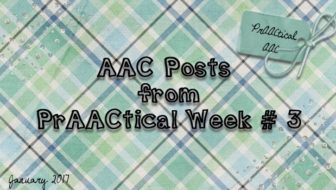
Here are a handful of posts you may have missed. Monday: PrAACtical Resources: Step-by-step Guide to Making a Tabbed Communication Book Wednesday: Video of the Week: A School-based Approach for Supporting the AT Needs of Young Children Thursday: Catching Up with National Joint Committee for the Communication Needs of Persons with Severe Disabilities
Filed under: Featured Posts
Tagged With: summary post
January 12, 2017
by Carole Zangari -
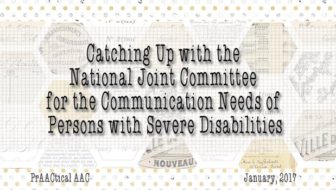
The NJC has been one of my go-to resources for many years, so I was delighted when Amy Goldman agreed to write an update on recent activities. Amy is one of my AAC heroes but you may know her best from her long career of advocacy with AAC and AT through professional organizations (e.g., ASHA, USSAAC, ATIA, PSHA, ATAP). Amy is now one of three technical assistance specialists with the national Assistive Technology Act Technical Assistance and Training Center (AT3). She recently retired from her position as Co-Executive Director of the Institute on Disabilities at Temple University, PA’s University Center of Excellence in Developmental Disabilities where she directed local, state, and federal projects related to assistive technology. She is honored to represent ASHA on the National Joint Committee for the Communication Needs of Persons with Severe Disabilities (NJC). She and I co-chair the ATIA strand on AAC and hope to see many... [Read More...]
Filed under: Featured Posts, PrAACtical Thinking
Tagged With: Communication Bill of Rights, NJC
January 9, 2017
by Carole Zangari -
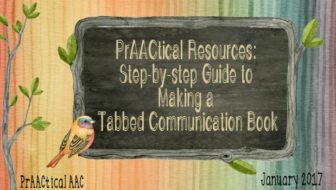
Sometimes it’s the little things that trip us up. A detail we missed, a corner we cut, or a small step we didn’t know about…Any of these can foul up an entire project (not too mention our mood!). That’s why appreciate clearly written guides like this one from Kate McCallum at Equality Time. Hope you find it helpful. Note: Those outside the UK will need to adjust printing for their own paper sizes.
Filed under: Featured Posts, PrAACtical Thinking
Tagged With: communication book
January 8, 2017
by Carole Zangari -
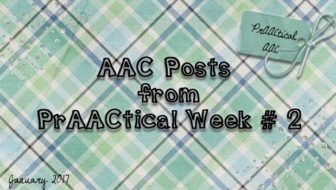
And the new year is off and running! Here are some posts you may have missed in your busy, AAC-filled week. Monday: PrAACtically January: AAC Resources for A Year of Core Words Wednesday: Video of the Week: Communication Strategies for Adolescents as They Transition through Adulthood Thursday: AAC and Emergent Literacy: 5 Posts with Implementation Ideas
Filed under: Featured Posts
Tagged With: summary post









